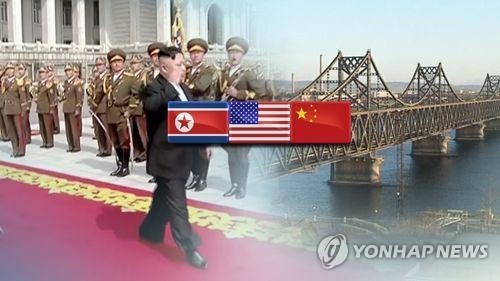The United States should target more Chinese banks in its sanctions against North Korea's nuclear and ballistic missile programs, an expert said Thursday.
Banks in North Korea's ally and major trading partner are the "source" of the nuclear problem, according to Anthony Ruggiero, a former Treasury and State Department official who now works as a senior fellow at the Foundation for Defense of Democracies.
"If the Chinese banks are not cooperating now, I think the next logical step will be going after Chinese banks," he told a forum hosted by the foundation.

Chinese banks have long been accused of handling money transactions that facilitate North Korea's development of nuclear weapons and ballistic missiles.
In June, the US blacklisted China's Bank of Dandong, citing it as a "primary money laundering concern."
But there were no additional Chinese banks in Tuesday's announcement of new US sanctions against 16 individuals and entities linked to the illicit programs.
"The Bank of Dandong is a small bank," Ruggiero said, noting the need to target larger institutions such as the Industrial and Commercial Bank of China, the largest bank in the world.
"I understand that people are very concerned that it will harm the US-China economy, US-China trade, but there's a way to do it," he said, suggesting the US simply call out the banks and warn them of significant fines without freezing their assets or cutting them off from the US financial system.
Washington imposed a $9 billion fine on a French bank as part of sanctions against Iran, he recalled.
Tom Malinowski, former US assistant secretary of state for democracy, human rights and labor, called for caution in expanding the sanctions regime.
"We need to be careful that sanctions are targeted on activities that directly benefit the North Korean state and their missile and nuclear programs, but not to try to kill all trade and commerce and communication between North Korea and China because that is what is empowering, ultimately in the long run, the North Korean people to bring change to their country," he said at the forum, referencing North Koreans' growing access to information about the world outside their reclusive state.
He also called for restraint in using the term "regime change"
in discussions about North Korea. That phrase, according to Malinowski, suggests the US will use military force to overthrow the regime and impose a different one.
"I think if we use that rhetoric it diminishes the legitimacy of the appropriate things we do to defend human rights around the world," he said. "Because if the people of North Korea had their rights, they would choose the right government. They would certainly not choose an arrangement that leaves them 10 times poorer than their brothers and sisters in South Korea. And there would be unification and the regime would not exist."
The rhetoric of "human rights" should replace "regime change,"
he added.
US Secretary of State Rex Tillerson, for his part, said early this month that a regime change is not what the administration wants.
"We hope that, at some point, they will begin to understand that and that we would like to sit and have a dialogue with them about the future that will give them the security they seek and the future economic prosperity for North Korea," he said at the time.
The secretary also noted: "But with an understanding that a condition of those talks is there is no future where North Korea holds nuclear weapons or the ability to deliver those nuclear weapons to anyone in the region, much less to the homeland." (Yonhap)







![[Weekender] Korea's traditional sauce culture gains global recognition](http://res.heraldm.com/phpwas/restmb_idxmake.php?idx=644&simg=/content/image/2024/11/21/20241121050153_0.jpg)